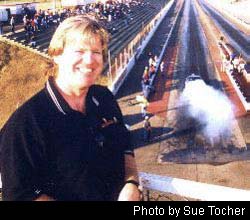
Let’s Speed Up Drag
Racing
8/8/05

 e
all know drag racing is the most visceral of motorsports,
with sight, sound, scent, touch, and even taste often contributing
to the overall experience. However, a recurrent knock against
the digs is they sometimes drag on (no pun intended); leading
to spectator—and even racer—burnout before an
event is completed. That point was driven home to me recently
when I attended a short-track stock car race.
e
all know drag racing is the most visceral of motorsports,
with sight, sound, scent, touch, and even taste often contributing
to the overall experience. However, a recurrent knock against
the digs is they sometimes drag on (no pun intended); leading
to spectator—and even racer—burnout before an
event is completed. That point was driven home to me recently
when I attended a short-track stock car race.
After covering stock cars for several years
before finally seeing the light and dedicating my efforts
to the chronicling of straightline competition, I was looking
forward to a return to my racing roots, so to speak. I hadn’t
seen a live roundy-round event in about four years, so it
was a familiar, yet distinct change of pace.
The rigs started rolling in to the speedway
about 1 p.m. for its weekly fare of six racing classes.
Entries ranged from beat-up four bangers on open trailers
pulled by equally beat-up pickups to state-of-the-art Late
Models transported in full-blown tractor-trailer units—not
unlike the spectrum of haulers you might find at any dragstrip
across the country.
The thing is—and it struck me as significant—these
guys were all arriving to race that night! Each class went
out individually over the next couple of hours for a couple
of group practice sessions, the track held a brief drivers’
meeting, each car in each division ran separate qualifying
laps to set the fields, and by shortly after 7 p.m. the
national anthem was playing and we were ready to go racing—right
on time. After a few spirited side-by-side duels punctuated
by brief cleanups for the inevitable collisions, I was in
my car by 11 that night and on my way knowing who all the
winners were.
It was a tight, compact experience that allowed
the diehards to arrive early for all the preliminary on-track
sessions, while still offering a predictable start time
for more casual fans to take in only the actual racing action.
Contrast that with the typical two- or three
days that even the simplest drag race involves. Racers arrive
Friday or Saturday to race on Sunday and more often than
not the schedule is anything but predictable, at least as
far as knowing ahead of time when each class will appear.
(And I’m not talking national events or bracket races
here, but rather the many special events or smaller touring
events that most strips periodically host.)
The format is not exactly fan friendly, as
it’s an all-day affair just to get qualifying completed,
and sometimes even then it’s not over, as was the
case at a drag race I attended the day after the stock car
event, where a final round of qualifying was held on Sunday
before the race. So, even if you were there all day on Saturday,
you couldn’t have left the track knowing for certain
who the top qualifiers were or how the elimination pairings
would shape up.
My question is, why can’t at least some drag racing
events adopt the one-day format that works so well for the
circle trackers? Granted, there are unique challenges, such
as typically four to six times more cars involved at a big
drag race, but drag racing allows for qualifying in pairs,
so attempts are completed much quicker. In the time it takes
for one stock car to find its raceday position, four, six,
or even eight drag cars might establish qualifying times.
Likewise, raceday at a dragstrip allows for many eliminations
over the time it takes to run a 30-, 50- or 100-lap stock
car race.
And where is it dictated that each competitor
must have multiple time trials followed by at least two,
but more typically three qualifying sessions? I’d
like to see a track promote a big event where the teams
might arrive the night before, but open testing begins bright
and early on Saturday—the only day that draws a decent
crowd, at least here in the south —offering just one
opportunity for each team to get a read on the track. If
you arrive late, too bad, give it your best guess in qualifying.
If you blow the tires off or break, well, at least you learned
something, but that would be your one and only chance before
the test session ended at a predetermined time.

